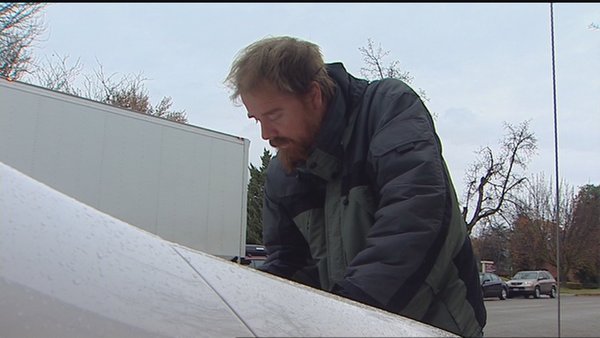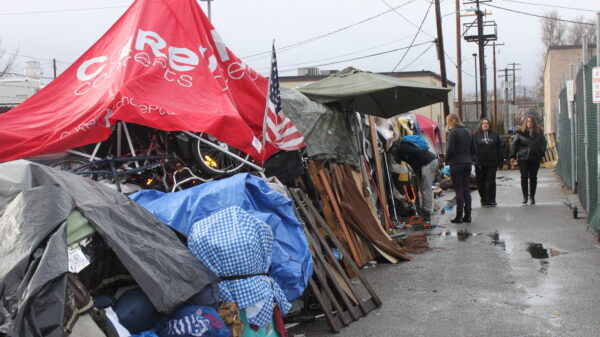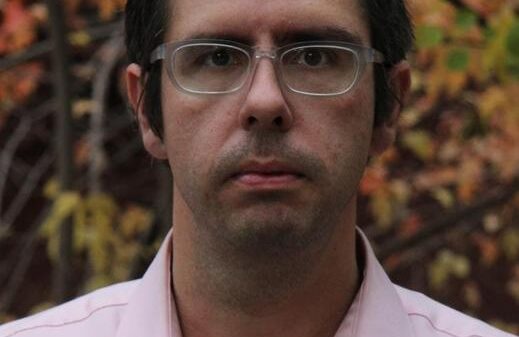By Kathy Griesmyer, Community Outreach Manager
On November 27th KTVB News Channel 7 aired a story
“Uncovering the Life of Panhandling” regarding panhandling in the homeless community.
Reporter Andrea Lutz and photojournalist Adam Worthington went undercover to investigate panhandlers who “choose to make a living off the generosity of others”. They dressed up Adam, created a sign, and stood out on the corner of 15th St. in downtown Boise near the I-184 overpass in the hopes of exposing the truth behind panhandling. As they continued to fly their sign they befriended a gentleman and proceeded to interview him about his experiences panhandling.
During their interview, they made sure to call attention to the fact that the gentleman arrived in a Dodge Durango and once brought his child in the snow to ask for money. What these investigative journalists forgot to mention in their report is that many individuals, whether they are experiencing homelessness or panhandling, are allowed to have cars. Many people are living on the brink of poverty and having a car provides transportation to their families or assists them in securing and retaining employment – the very thing that may help lift them out of poverty. And did they forget to ask if this gentleman brought his child with him because he was unable to secure safe and affordable childcare?
While this story did offer some insight to the homeless community, it failed to show a true representation of the actualities of those experiencing poverty and homelessness here in Boise. If these reporters wanted to present a well-balanced, unbiased report, then they should have visited several of the day shelters where they would find families, victims of domestic violence, veterans, individuals with mental illness, and hard-working low-income Americans who are simply going through a rough time and aren't privileged enough to have parents, friends, or a social network to assist them during their time of need.
Journalists are supposed to portray the truth, report on injustices in the community, and educate the public on the facts. Their story made note that there are several non-profit resources for those experiencing homelessness, yet they forgot to mention that many of these organizations are feeling the strains of our still recovering economy and at times, have to turn individuals away for lack of adequate resources. If these reporters want to accurately inform the public about homelessness in Boise, we encourage them to contact the
Boise/Ada County Homeless Coalition comprised of 18 member organizations serving the homeless to secure permanent housing, find shelter, receive job training, and further their education.
Another known fact the journalists forgot to mention? The
City of Boise 10 Year Plan to Reduce and Prevent Chronic Homelessness that is currently in year six of its implementation and has failed to produce any results. According to the City’s plan, its most recent accomplishment was that the implementation strategy was being developed, and that was back in November of 2007. That’s six years the City of Boise has wasted on increased housing opportunities, securing permanent solutions to homelessness, providing better information and resources to homeless individuals, and engaging the community in support of the plan.
Instead of furthering the goals of its 10 Year Plan, the City of Boise chose to pass its anti-solicitation ordinance (ORD-34-13) which further
criminalizes homelessness by restricting when and where an individual can ask for money in Boise. This ordinance was passed despite
federal guidance stating criminalization practices may violate both our constitutional and human rights obligations. It bans protected free speech and expression in public areas in Boise, and unfairly burdens struggling families in our community who need help. And because of its discriminatory ordinance, the City must now divert funds that could be used to address homelessness to defend its ordinance in federal court thanks to a
lawsuit filed by the ACLU and
National Law Center on Homelessness & Poverty in late October.
Rather than sharing the full and nuanced picture of our friends, family, and neighbors suffering from poverty in Boise, this report furthered a stigma against the homeless community, labeling them as scammers who pull on the “heart strings of the generous”. Such a stance only perpetrates a continued, flawed discussion on poverty and homelessness that leaves those most vulnerable without any humanity attached to their story. We hope that in future programming choices, KTVB recognizes the influence they possess in informing the public and instead choose to report fair, accurate, and unbiased news stories when covering topics of this importance.



